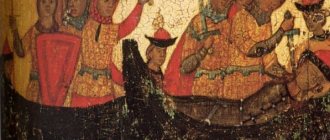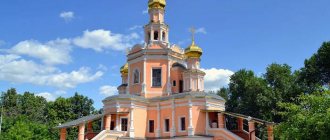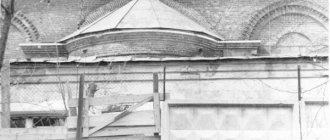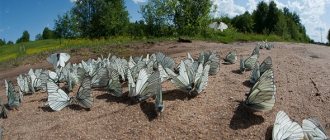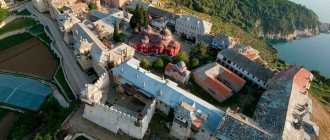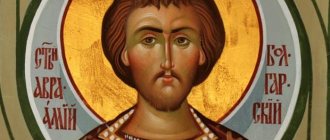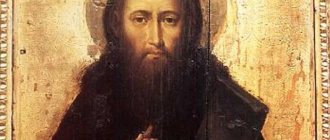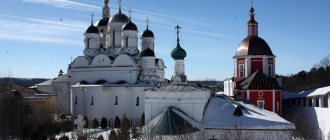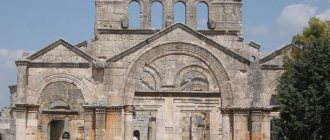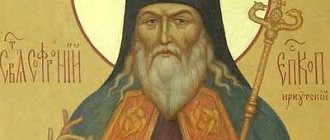In 1015, the great Kiev prince Vladimir Svyatoslavovich died. After his death in Rus', an internecine struggle for power broke out between his sons. Only two people did not participate in it - the Russian princes Boris and Gleb.
The sons of Grand Duke Vladimir, following the example of the great Christian saints and ascetics, called for humility and Christian mercy.
They were vilely killed by their elder brother Svyatopolk, nicknamed “The Damned” for this act. This is how the first Russian saints appeared in the Russian land.
The first Russian saints Boris and Gleb - patrons of the Russian land
The noble princes Boris and Gleb received the names Roman and David at baptism. They are the youngest sons of Grand Duke Vladimir Svyatoslavovich and the Byzantine princess Anna. She belongs to the Macedonian dynasty.
Anna is the only sister of the Byzantine Emperor Vasily II the Bulgarian Slayer and the granddaughter of Emperor Constantine VII Porphyrogenitus.
Holy noble passion-bearing princes Boris and Gleb. Icon. The author is icon painter Viktor Morozov, also known as Izograph Morozov
It is unknown when the holy brothers were born. Historians claim that this happened during the years of the baptism of Rus' by their father.
Grand Duke Vladimir Svyatoslavovich gave them different cities as their inheritance: Boris began to reign in Rostov, and Gleb in Murom. This happened around 987-989.
987 — 989
approximate birth years of brothers Boris and Gleb
The brothers were vilely killed by Svyatopolk, the eldest son of the holy Equal-to-the-Apostles Prince Vladimir, who wanted to seize the Kiev table. The saints, honoring the commandments of God, meekly accepted their fate.
That is why they became the first Russian saints who were canonized as martyrs-passion-bearers by both the Russian and Constantinople Churches.
The Russian Orthodox Church considers them the heavenly patrons of the Russian land.
Veneration of the saints
All subsequent descendants of Prince Vladimir honored their murdered relatives. Most of all, Vladimir Monomakh served them, who in 1102 transferred the holy relics, decorating the coffins with gold, silver and crystal candlesticks.
On a note! The names of the passion-bearing brothers became known throughout the earth as an example of humility and obedience to the Lord.
Throughout the year, the Orthodox Church celebrates the patronal feasts of the passion-bearers Roman and David several times:
- On May 15, Orthodox Christians pay tribute to the memory of the saints, whose relics were transferred in 1115 to the Vyshgorod tomb, built by Izyaslav Yaroslavich.
- On August 6, the Orthodox world honors both brothers - passion-bearers.
- September 18 is the patronal feast day of Prince Gleb.
Icon of the martyrs Boris and Gleb
In ancient literature, the lives of Saints Boris and Gleb were the basis for many tales and traditions, which were subsequently supplemented by testimonies of miracles performed through the prayers of the holy martyrs.
The blood of humbly loving brothers marked the beginning of the end of internecine strife in Rus'. This fertile seed was sown to strengthen the Russian lands.
A short biography-life of Boris and Gleb compiled on the basis of ancient Russian chronicles
Only a brief biography of Boris and Gleb is known, while the lives of the saints were compiled on the basis of ancient Russian chronicles.
Researchers recognize “The Tale of Boris and Gleb” as the main source of knowledge about their lives. Scientists claim that it was written by Jacob Chernorizets.
"The Tale of Boris and Gleb." Facial miniatures from the Sylvester collection of the 14th century
Nestor the Chronicler wrote “Readings about Boris and Gleb” in the 1080s
Another version says that the life of Boris and Gleb was compiled on the basis of the “Readings about Boris and Gleb” written by Nestor the Chronicler in the 1080s.
If the “Tale” speaks of miracles performed by the saints, then the Chronicle and “Reading” describe their murder.
From these sources you can get an idea of who the passion-bearers Boris and Gleb were, as well as what they did to honor the commandments of God.
Nestor the Chronicler, the author of “Reading about Boris and Gleb,” says that the holy passion-bearers, the only ones of all the sons of Vladimir, were left with him at an early age.
This happened because of their youth. Apparently, the father was afraid that the young princes would not be able to cope with reigning in their volosts.
Saint Prince Boris knew how to read and write, read the Holy Scriptures and the lives of saints.
Therefore, the brothers’ young years of life were spent under the paternal care of their father.
Moreover, if Saint Gleb was considered a young child, then the eldest of the brothers, Boris, showed outstanding abilities during his life under his father.
He knew literacy, loved to read books, knew the Holy Scriptures.
Boris and Gleb on horseback. Icon of the 14th century. Holy Prince Gleb was influenced by his educated and pious brother Boris. That is why the brothers chose true Christians
Under the influence of his brother, Gleb also received a Christian upbringing. When Boris prayed to the Lord to send him the fate of one of the saints, Gleb listened to him attentively.
Chronicles say that both brothers had a merciful and kind character. They helped and protected the poor, sick and disadvantaged.
The first canonized saints
The Christian feat of Saints Boris and Gleb, manifested in virtue - love, was a new phenomenon in Rus', where it was the norm to take revenge with blood for blood.
The young princes, through their humble acceptance of martyrdom, showed the Christian world an example of obedience to the older generation, having received the grace of becoming the first saints canonized by the Russian Orthodox Church as passion-bearers.
Important! Passion-bearing is a rite of holiness; this name is given to a saint who accepted martyrdom in the name of God, without violating God’s commandments.
The brothers did not hold a grudge against Svyatopolk, with tenderness they forgave and blessed their murderer, offering no resistance when the executioners arrived.
Historians have not found the exact date of the brothers' canonization.
- According to some sources, this happened in 1020, when the relics of the martyr Gleb were transferred to Vyshegorod.
- Others claim that the great event dates back to 1021, during the consecration of the first church built in honor of the passion-bearers Boris and Gleb, whose lives have been revered since the day of their burial.
- Most theologians are inclined to the date of 1072, when the sons of Yaroslav the Wise consecrated a new stone temple and transferred holy relics to it.
Important!
The Russian people honor the brothers Boris and Gleb as defenders of Russian Christian values and the Russian land. Saint images depicting the brothers appeared simultaneously with their canonization. The first icon of Boris and Gleb was painted by order of Yaroslav the Wise; it is dated 1070.
In the 11th-12th centuries, images of brothers appear on reliquaries.
According to tradition, Boris and Gleb are depicted together in one icon, they are dressed in princely attire, holding a cross, symbolizing martyrdom, and a sword, a symbol of the principality.
The murder of Boris and Gleb is the work of Svyatopolk the Accursed
The murder of princes Boris and Gleb was the work of Svyatopolk the Accursed. This is the generally accepted version of the development of events, which was first put forward in “The Tale of Boris and Gleb.”
The purpose of this crime was power, because Svyatopolk wanted to become the Grand Duke of Kyiv.
Prince Vladimir Svyatoslavovich with his sons. Moscow Kremlin. Faceted Chamber. Fragment of a painting by craftsmen from Palekh
The Grand Duke of Kiev Vladimir Svyatoslavovich died at the age of seventy. By this time, he had eleven relatives and one adopted son. In addition, the prince also had fourteen daughters.
Svyatopolk was the adopted son of the prince. His father didn't love him. The fact is that Svyatopolk’s mother was married to the Grand Duke’s brother Yaropolk.
The chronicle claims that he forcibly removed her from the nunhood, took her as his wife, and she became pregnant by him with Svyatopolk. Already pregnant, Vladimir took her in.
Svyatopolk and Yaroslav (the natural son of Grand Duke Vladimir) were considered the eldest in the family. They pursued their own policies, which the prince did not like.
History has preserved the name of Yaroslav as Yaroslav the Wise. He reigned in Veliky Novgorod, and Svyatopolk in Turov.
Svyatopolk Vladimirovich Damned. Artist V. Sheremetyev. 1867
That is why the Grand Duke imprisoned Svyatopolk together with his wife, the daughter of the Polish prince Boleslav I the Brave. The basis was suspicion of conspiracy.
After the death of Vladimir Svyatoslavovich. Svyatopolk came out of prison and, by right of being the eldest in the family, took the Kiev table.
At the same time, the Grand Duke during his lifetime planned to give power to Boris. The self-proclaimed prince of Kiev began a fierce struggle with his half-brothers, the Vladimirovichs.
The holy passion-bearers princes Boris and Gleb became her victims.
The meaning of noble princes in Orthodoxy
If we take into account the unofficial version of events of the 11th century, the canonization of Russian princes takes on special significance. The exact date has not been established, but their veneration as saints began under Yaroslav the Wise. Boris and Gleb are numbered among the martyrs-passion-bearers. The face of saints unites Christians killed by Christians without resistance. There are similarities between their fate and the death of the Romanov family. The princes suffered innocently in the internecine war. People were healed at the relics of the saints, so they began to be revered as miracle workers and healers. For the princely descendants they became patrons and are considered protectors of the Russian land.
Boris and Gleb acted according to the Christian law, which yesterday’s pagan Russians did not yet know well. The brothers showed an example of higher love. As First John says, anyone who says he loves God but raises his hand against his brother is a liar. They preferred to die immediately rather than fight with their brothers. The body can be killed, but the soul is immortal. The feat of the holy princes lies in the fact that they did not return evil for evil, but humbled themselves before the will of their elder brother.
If the princes had rebelled against Svyatopolk, they would not have received such honor as grace in Heaven and eternal memory. But the princes sacrificed their lives to preserve peace. Svyatopolk is compared to Cain. He received retribution for fratricide. After defeat in the battle with Yaroslav the Wise, Svyatopolk hid in Poland and could not find refuge for himself. After his death, his grave was considered unclean. The princes he killed symbolize God's Punishment.
The winner does not always win. This is confirmed in Serbian history, when King Lazar received a revelation from God. If he wins, he will reign on earth, and if he loses, he will reign in Heaven. Lazarus chose the eternal Kingdom of Heaven. Victory can turn into loss. Boris and Gleb are strong warriors. Like Lazarus, they knew when to use weapons and when to die from them.
History says that his father’s squad invited Prince Boris to go to Kyiv, but he refused
Prince Boris enjoyed the love and support of both the squad and the Kyiv people. That is why Vladimir’s squad suggested that he go to war against Svyatopolk and take away the grand-ducal table from him.
“I will not raise my hand against my elder brother: if my father died, then let this one be my father instead,”
- the chronicler quotes Boris as saying.
Murderers at the tent of Prince Boris (above); murder of Prince Boris and Georgy Ugrin (below). Miniature from the Sylvester collection, 2nd half of the 14th century
Because of this, his father’s squad left him. It is possible that she went over to Svyatopolk’s side. Only servants remained to guard Saint Prince Boris.
As the chronicle says: “And then it was the Sabbath day.” The saint spent the night before his death in his tent in solitude and prayer.
July 24
Saint Prince Boris was killed by order of Svyatopolk
Svyatopolk, who promised his brother brotherly love and an increase in his inheritance, decided to kill him and sent the Vyshny Novgorod boyars led by Pushta to him.
On Sunday, July 24, the murderers came to the passion-bearer’s tent. They heard him singing psalms and decided to wait until nightfall. At night they attacked the sleeping prince and pierced him with spears.
The Varangians pierce the heart of Prince Boris with a sword (above); Prince Boris's coffin is being carried for burial (below). Miniature from the Sylvester collection, 2nd half of the 14th century
His Hungarian servant Georgy tried to protect Boris and he was pierced along with him. The saint was still breathing when he was wrapped in a tent cloth and taken to Svyatopolk.
The same, having learned about this, ordered two Varangians to stab his brother with a sword.
Since the people of Kiev were afraid to accept the body of the saint, he was buried in Vyshgorod next to the Church of St. Basil. The holy passion-bearer Prince Boris died a martyr's death at the age of 25.
Story
Princes Boris and Gleb were the first Russian saints to be canonized in 1078. What is their holiness?
Let's move mentally to the year 1015. The reign of the holy Equal-to-the-Apostles Prince Vladimir, the baptizer of Rus', is nearing the end. Christianity in Rus' is still a few years old and the morals and customs of pagan times are still strong. Brother rebels against brother, son against father. There were frequent feuds between princely families and even within the same family. Raids from neighboring peoples and nomadic tribes are disturbing the Russian land.
And then again the news came about the Pecheneg raid. Prince Vladimir, stricken by illness, sends his son Boris against them. The young prince was then a little over 20 years old. Boris was the favorite son of Prince Vladimir and it was to him that he wanted to leave the throne.
Just at the very time when Boris was on a campaign against the Pechenegs, Equal-to-the-Apostles Prince Vladimir dies in Kyiv. Vladimir’s eldest son, Svyatopolk, insidiously seizes power. He realized that Boris was dangerous for him. How to defend the power he seized? And Boris was already returning at the head of a large army.
It would seem that he could easily defeat Svyatopolk and take power (his army numbered 8 thousand people). But young Prince Boris already lives with a different understanding of life. He is a Christian, he cannot raise a hand against his brother. In prayer he gains conviction - I will not raise my hand against my brother, and even my elder one, whom I should honor as my father.
And amazingly, Boris received a warning in a dream about the death awaiting him. She introduced herself to him in the form of a terrible black beast. But he still lets the squad go. And the murderers sent by Svyatopolk carry out their dirty deed. Prince Boris was killed in his sleep, after evening prayer.
Svyatopolk decided to deceive Prince Gleb, who was in Murom at that time, to lure him to Kyiv. He hid his father's death from his brother, ordering the messengers to report:
Come quickly, your father is calling you, he is very sick.
Gleb was warned about Svyatopolk’s villainy, but still he set off to meet his death. The assassins sent dealt with the youngest son of Prince Vladimir as he sailed on a boat along the Dnieper. The prince's body was thrown between two logs and remained unfound for a long time.
A fiery sign and angelic singing showed people where the remains of the passion-bearing prince were located. The relics of the saint were found incorrupt 4 years after the villainous murder and were buried in the same grave with Boris.
The villainy did not help Svyatopolk. After a fierce struggle, he was forced to flee by Yaroslav, who arrived from Novgorod, and later received the nickname “Wise.”
How did the holiness of Boris and Gleb manifest itself? After all, it was as if they suffered not for their faith, but for the usual political strife of that time. But no. It was precisely for faith, for that new conviction for its time that the sin of crime, murder, cannot establish justice on earth.
Christ the Savior commanded:
Love your enemies, bless those who curse you, do good to those who hate you, and pray for those who abuse you.
And Boris, knowing about the impending atrocity, prays:
Grant me, O God, to accept this suffering, not from my enemies, but from my brother. Do not blame him for this, Lord.
And his younger brother, Gleb, also humbly meets his death. This was a true feat of faith. This was a manifestation of a completely new, unprecedented view of the world at that time.
Svyatopolk died a shameful death, ruined his soul and was cursed for all time with the nickname “Cursed.” This is how it was and how it will always be. The triumph of evil is a temporary appearance. Evil may triumph for a while, but it is always doomed in the face of eternity. The holy princes Gleb and Boris, in the minds of the Orthodox people, will forever remain victorious wars, bringing death to every evil deed.
The lives of the saints say that Prince Gleb was stabbed to death by his own cook
After the murder of Prince Boris, Svyatopolk decides to deal with Gleb. Researchers believe that he did it out of fear of revenge from his half-brother, Prince Boris. There are two versions of the death of the saint.
One by one, Svyatopolk calls on Gleb, who does not yet know about his father’s death, to urgently come to him in Kyiv. According to another, the passion-bearer was in Kyiv and fled from it to the north, fleeing death.
The assassins are waiting for Prince Gleb (above); murder of Prince Gleb (below). Miniature from the Sylvester collection, 2nd half of the 14th century
In any case, he stops near Smolensk.
If we take the main version of events of Prince Gleb about the death of his father and the murder of his brother Boris, as well as his brother Yaroslav warned about the preparation of an assassination attempt on him from Veliky Novgorod.
September 5
Prince Gleb suffered martyrdom
The killers sent from Svyatopolk arrived to the saint on September 5.
They captured the prince's ship and declared their intention to kill him. The lives of the holy prince indicate that he himself forbade his retinue from using weapons to protect him.
Murder of Gleb on Smyadyn. Miniature. Radzivilov Chronicle. By order of the warrior Svyatopolk the Accursed Goryaser, the cook of the holy prince Gleb Torchin cut off his head
The killers were led by Goryaser, a warrior of the fratricide. He ordered Saint Torchin's cook to kill him. Researchers claim that the traitor came from the Torok tribe.
The body of the murdered man was buried right at the scene of the murder on the banks of the Dnieper. At the same time, the body was placed like a peasant in an ordinary hollowed out log.
After Yaroslav occupied Kyiv in 1019, he ordered the body of the holy prince to be found and buried next to the ashes of Boris at the Church of St. Basil.
The Legend of Boris and Gleb
Prince Vladimir Svyatoslavich had twelve sons from different wives. The third in seniority was Svyatopolk. Svyatopolk's mother, a nun, was disrobed and taken as a wife by Yaropolk, Vladimir's brother. Vladimir killed Yaropolk and took possession of his wife when she was pregnant. He adopted Svyatopolk, but did not love him. And Boris and Gleb were the sons of Vladimir and his Bulgarian wife. Vladimir sent his children to reign in different lands: Svyatopolk - in Pinsk, Boris - in Rostov, Gleb - in Murom.
Continued after advertisement:
As Vladimir's days drew to a close, the Pechenegs moved into Rus'. The prince sent Boris against them. He set out on a campaign, but did not meet the enemy. When Boris was returning back, the messenger told him about the death of his father and that Svyatopolk tried to hide his death. Listening to this story, Boris began to cry. He realized that Svyatopolk wanted to seize power and kill him, but decided not to resist. Indeed, Svyatopolk insidiously took possession of the Kyiv throne. But, despite the entreaties of the squad, Boris did not want to drive his brother out of his reign.
Meanwhile, Svyatopolk bribed the people of Kiev and wrote a kind letter to Boris. But his words were lies. In fact, he wanted to kill all of his father's heirs. And he began by ordering a squad consisting of Vyshgorod men led by Putynya to kill Boris.
Boris set up his camp on the Alta River. In the evening he prayed in his tent, thinking about his imminent death. Waking up, he ordered the priest to serve matins. The murderers sent by Svyatopolk approached Boris’s tent and heard the words of holy prayers. And Boris, hearing an ominous whisper near the tent, realized that these were murderers. The priest and Boris's servant, seeing the sadness of their master, grieved for him.
Briefly exists thanks to advertising:
Suddenly Boris saw the killers with naked weapons in their hands. The villains rushed to the prince and pierced him with spears. And Boris’s servant covered his master with his body. This servant was a Hungarian named George. The killers struck him down too. Wounded by them, George jumped out of the tent. The villains wanted to inflict new blows on the prince, who was still alive. But Boris began to ask to be allowed to pray to God. After the prayer, the prince turned to his murderers with words of forgiveness and said: “Brothers, having begun, finish what was commanded to you.” This is how Boris died on the 24th day of July. Many of his servants were also killed, including George. They cut off his head to remove the hryvnia from his neck.
Boris was wrapped in a tent and taken away on a cart. As they drove through the forest, the holy prince raised his head. And two Varangians pierced him with a sword in the heart again. Boris's body was laid in Vyshgorod and buried near the Church of St. Basil.
After this, Svyatopolk conceived a new crime. He sent Gleb a letter in which he wrote that his father, Vladimir, was seriously ill and was calling Gleb.
The young prince went to Kyiv. When he reached the Volga, he slightly injured his leg. He stopped not far from Smolensk, on the Smyadyn River, in a boat. The news of Vladimir's death, meanwhile, reached Yaroslav (another of the twelve sons of Vladimir Svyatoslavich), who then reigned in Novgorod. Yaroslav sent Gleb a warning not to go to Kyiv: his father died and his brother Boris was killed. And when Gleb was crying about his father and brother, the evil servants of Svyatopolk, sent by him to kill, suddenly appeared in front of him.
Continued after advertisement:
Saint Prince Gleb was then sailing in a boat along the Smyadyn River. The killers were in another boat, they began to row towards the prince, and Gleb thought that they wanted to greet him. But the villains began to jump into Gleb’s boat with drawn swords in their hands. The prince began to beg that they would not ruin his young life. But Svyatopolk’s servants were relentless. Then Gleb began to pray to God for his father, brothers, and even for his murderer, Svyatopolk. After this, Glebov's cook, Torchin, stabbed his master to death. And Gleb ascended to heaven and met there with his beloved brother. It happened on September 5th.
The murderers returned to Svyatopolk and told him about the fulfilled command. The evil prince was delighted.
Gleb's body was thrown in a deserted place between two logs. Merchants, hunters, and shepherds passing by this place saw a pillar of fire, burning candles, and heard angelic singing. But no one thought to look for the saint’s body there.
And Yaroslav moved with his army against the fratricide Svyatopolk to avenge his brothers. Yaroslav was accompanied by victories. Arriving at the Alta River, he stood at the place where Saint Boris was killed and prayed to God for the final victory over the villain.
Briefly exists thanks to advertising:
The slaughter on Alta lasted the whole day. By evening, Yaroslav prevailed, and Svyatopolk fled. He was overcome by madness. Svyatopolk became so weak that he was carried on a stretcher. He ordered to run, even when the chase stopped. So they carried him on a stretcher across Polish soil. In a deserted place between the Czech Republic and Poland, he died. His grave has been preserved, and a terrible stench emanates from it.
Since then, strife has ceased in the Russian land. Yaroslav became the Grand Duke. He found Gleb's body and buried him in Vyshgorod, next to his brother. Gleb's body turned out to be incorrupt.
Many miracles began to emanate from the relics of the holy passion-bearers Boris and Gleb: the blind received their sight, the lame walked, the hunchbacked straightened. And in those places where the brothers were killed, churches were created in their name.
The day of canonization of the holy passion-bearers Princes Boris and Gleb is unknown
The death of Boris and Gleb caused outrage among the people and Russian princes. At the same time, Svyatopolk paved the way for civil strife, fighting with the remaining contenders for the throne.
The year 1019 is memorable for the fact that Prince Yaroslav, later nicknamed the Wise, defeated the regiments of the fratricide, together with the Pechenegs allied to him, and became the Grand Duke of Kyiv.
B. A. Chorikov. "The Flight of Svyatopolk." XIX century Prince Svyatopolk the Accursed, after his expulsion from Kyiv by Yaroslav the Wise, according to the chronicles, went mad
Svyatopolk fled to Beresten, but died on the way. As the chronicler Nestor says, he suffered paralysis and went crazy. The place of his death is unknown.
Legend claims that he was buried in a deserted place, and a stench emanates from his grave.
After the victory over the fratricide, Prince Yaroslav began to collect information about his brothers. So, by his order, the holy noble prince Gleb was buried next to the body of his brother Boris in Vyshgorod.
Miracles begin to happen at their grave. For example, the Church of St. Basil, next to which the saints are buried, burned down. Church utensils and icons remained intact. This was considered a miracle.
Construction of the Boris and Gleb Church in Vyshgorod and the transfer of the relics of the brothers to the new temple in 1115. Fresco
It is impossible to name the exact date of the canonization of the princes.
The most common version says that this happened during the transfer of the relics of the passion-bearers to the church built for this purpose by order of Yaroslav the Wise.
20 May 1072
on this day the relics were transferred to the church built for this
The ceremony was attended by the children of the Grand Duke of Kyiv, Kiev Archbishop George, and the clergy.
Boris and Gleb: the story of princes who refused to kill their cruel brother and were killed themselves
Approximate reading time: 10 min.
In the times of Ancient Rus', an ordinary family consisted of at least six to eight people. As a rule, families were very friendly and united. But it also happened that having many children led to serious conflicts and a fierce struggle for the inheritance left after the death of the parents. At the same time, any means were used, including the physical elimination of competitors. Not only representatives of the “interested parties,” but also innocent people became victims of such civil strife. A similar drama played out in the family of the Great Prince of Kyiv Vladimir immediately after his death in 1015.
The Baptist of Rus' had 13 sons and 10 daughters from six wives. Vladimir died in adulthood, suddenly, after an illness, and, as often happens, the direct transfer of the throne did not take place. The main difficulty after the death of the Grand Duke was that 11 of his sons were born into paganism, and only two - Boris and Gleb - were children from a church marriage. A very difficult question has arisen. The eldest male descendant has the right to the Great Reign. But who exactly is considered the eldest? If we are talking about seniority in general, then this was Svyatopolk - the second son of the prince and the eldest at that time (the first son Vysheslav died during his father’s lifetime). If we are talking about seniority among legitimate sons, then the heir should have been Boris, who turned 29 years old in 1015.
Svyatopolk and Boris were completely different people. Born into paganism and not much different from his surroundings, Svyatopolk accepted Christianity in adulthood. He was not distinguished by piety, and was baptized more likely for political reasons than for personal convictions. The origins of the prince are very vague - his mother was a nun before cohabiting with Vladimir, but at the same time she had a very impressive appearance. She attracted the attention of Vladimir's brother Yaropolk, who acted quite traditionally for that time - he made the woman his concubine, despite the vows of chastity given to her during tonsure. And who, in fact, was interested in the opinion of the unhappy woman? Did the prince like it? Do you want to live? Then go to his mansion. From this connection Svyatopolk was born. But even when he was in his mother’s womb, Vladimir, in a struggle for power, killed Yaropolk and took the Kiev throne. All the brother’s property, including the beautiful concubine, went to the winner. Vladimir accepted the woman into his circle, made her his favorite, and proclaimed the unborn child his own child.
Image of Svyatopolk Vladimirovich from his seal
However, the prince was never able to fall in love with his adopted son. First - because he was a reminder of his murdered brother, then - because he did not live up to his hopes. Svyatopolk grew up as a rude warrior and did not possess the qualities that a statesman should have. Boris and Gleb are a different matter. They were born even before the Baptism of Rus', but their childhood passed in a completely different atmosphere - Kyiv rose to the level of European cities, connections with Byzantium and Bulgaria were established, preachers, scientists and missionaries came to the capital of Rus'. The younger Vladimirovichs received a good education, but most importantly, they grew up with a Christian father, who managed to instill in his sons the beginnings of sincere faith and love for evangelical ideals. Having matured, Boris and Gleb became Vladimir’s faithful companions and carried out the prince’s most important assignments. At the same time, the holy brothers were distinguished by simplicity and accessibility, they did not boast of their origin, they were friendly with everyone, and this behavior very quickly allowed them to gain the respect of the people and boyars. There are some reasons that the Baptist of Rus' was seriously thinking about passing the throne to Boris. But I didn’t have time...
***
...The year was 1015. News began to reach from the south that the nomadic Pechenegs were preparing to attack the Kyiv lands. Having received the intelligence report, Vladimir became gloomy. Oh, how inopportune this report was! Now he was lying bedridden, the state was on the verge of civil strife, and then there were these Pechenegs... Vladimir called the servant.
- Radomir, get ready, take a few more guides and go to Rostov. Don’t stop anywhere for a long time, except to change horses. I need Boris. Urgently. Also tell our warrior Pinega to equip his squad. Looks like we'll have to work hard again...
Boris galloped up quickly. He already knew that his father would not call him just like that. Without taking off his weapon, the prince ran up to the porch of the palace, crossed several rooms and found himself in a spacious chamber. Vladimir was lying on the bed, his face was pale. Several servants were fussing around the exhausted prince, and in the corner in front of the icons a monk was reading the Psalter. The appearance of Boris revived Vladimir a little; a familiar light flashed in his eyes for a moment. Signaling to the servants to vacate the room, he called his son to him.
- Son... We are going through a bad time now. They reported to me that the steppe was moving again. I wish I could check it out in person, but I can’t—see, I’m sick. Gather a squad, call on a few more princes along the way - perhaps you will really have to face the steppe people. Go, figure it out, then come back here. I want to declare you the heir...
- Father, I will do everything as you order! Your will is my will, you know. Only now... This confuses me greatly... Heir... You can better see into whose hands the throne of our ancestors should be given. But won't this be a temptation for my brothers? Will they accept me as their elder?
- They will accept! No one has yet gone against the will of Vladimir Rurikovich! Nobody! “At that moment it seemed to Boris that in front of him was not a sick, weak man, but a gigantic hero who simply lay down to rest before the battle. But it was only a moment. The exhausted prince was lying on the bed again. He quietly hugged and kissed his son.
- Go... Then we’ll discuss everything... And may God bless you!
***
The alarm turned out to be false - neither the patrols nor the intercepted “tongues” confirmed the previous reports. The steppe was calm. Boris was embarrassed, all this seemed very suspicious to him, and he decided to wait a day or two at the border. A week passed, but the steppe was still calm, and the patrols brought no news except enthusiastic stories about shot hares and quails. Boris gave the command to get ready to head back. Suddenly a column of dust swirled in the distance. He was quickly approaching, and soon the prince distinguished ten horsemen. A golden cross on a crimson banner indicated that the cavalry rushing towards them was Russian. Boris became wary. When there were less than a hundred steps between the camp and the unexpected guests, a horseman separated from the group and galloped straight to the prince’s tent.
Boris. Fragment of an icon from the Savvo-Vishera Monastery, XIII - early XIV centuries.
“My lord,” the horseman began his speech, breathing heavily. - Your father, our Grand Duke... Your father died and went to his ancestors...
Boris's ground floated away from under his feet, and he slowly, as if unconscious, sat down in the dusty grass. The prince immediately remembered his cheerful childhood, his young strong father, his smile and lively booming voice. I also remembered the first communion, when Vladimir himself carried him, a five-year-old child, to the Chalice. I also remembered my first ride on a horse, when as a little boy I was both scared and happy. He also remembered the military campaigns, during which the prince taught him, still a very green warrior, how to properly use weapons. When he came to his senses, the entire camp already knew the sad news. Someone prayed, someone, according to the old custom, drank to the repose of the master. And everyone was silent. It seemed that everything around was filled with mournful silence.
- My Lord! — the figure of the envoy from the capital again appeared in front of Boris. - Your brother Svyatopolk took the Kiev throne. People have already sworn allegiance to him. “He asked me to give you this,” the messenger handed the prince a sealed scroll.
It was a letter from Svyatopolk, who offered peace and cooperation. Boris understood what his brother was driving at - he felt that his position was very precarious, and hurried to enlist the support of his legitimate son Vladimir. But there was also a hidden threat in his letter. Boris knew that the new Kiev prince was a very treacherous person, and was now simply looking for allies to start a war against the rest of his brothers. Most of all, Boris was oppressed by the thought that if he began to help Svyatopolk, he would have to kill his beloved brother Gleb - such was the law of that wild time. The last thing the prince wanted was to participate in this meat grinder. And he also understood that Svyatopolk himself would try to destroy him at the right opportunity...
- Be our prince! You are the legitimate son of Vladimir! All the people will follow you, lead us to Kyiv! Take what is rightfully yours! - the soldiers shouted as Boris walked between the ranks of the warriors. He himself understood that this path was very attractive, and it cost him nothing to overthrow Svyatopolk from the throne. But Boris knew perfectly well how such overthrows end - in blood, riots, perjury. Of course, then it will be possible to pray for all this, cover it with a black monastic robe, and appease God with another stone church. No, Boris didn’t want this! He wanted one thing - to be faithful to Christ and stay away from political struggle. Having gained strength, the prince stepped into the circle in front of the soldiers and said:
- Brothers! I will not fight for the throne! My place is here, on the border - to defend the Fatherland!
And Boris was abandoned! Only a handful of faithful servants remained with him, who were ready to follow him to death. The rest of the soldiers left to take the oath to the new ruler. These were people who only knew how to fight. It makes no difference - with whom and in the name of what.
Several days passed. The detachment continued to carry out patrol. At night, having bypassed the posts, Boris returned to the tent and began to read prayers before going to bed. He had already been informed that somewhere nearby a detachment sent by Svyatopolk to kill him was circling. After praying, he fell asleep, but did not sleep for long. It was already getting gray outside. The prince called the camp priest, and they began to perform the morning rule. Suddenly a whisper was heard behind the walls of the tent. A moment - and four armed executioners burst into the tent with a crash. The servants tried to protect Boris, but they were all killed immediately.
Boris's body was pierced through with spears four times, but even after that he was still alive. Bleeding, the saint ran out of the tent and saw how Svyatopolk’s men were finishing off the remaining soldiers. The martyr fell to his knees and with the last of his strength said:
- Glory to Thee, Lord, for allowing me to drink this cup to the dregs!
Then he turned to the killers:
- Finish what is assigned to you quickly! And may there be peace to my brother and to you!
When they loaded him onto the cart, he was already dead. But for the avoidance of doubt, the killers pierced Boris's heart twice. After returning to Kyiv, he was buried secretly from everyone, rightly believing that such a barbaric crime would cause the indignation of the people and tarnish the reputation of the prince. And so it happened - the rumor about the murder spread very quickly and reached Vladimir’s other sons. Gleb also learned about the tragedy.
Gleb. Fragment of an icon from the Savvo-Vishera Monastery, XIII - early XIV centuries.
...The youngest of the holy martyrs was killed on the road to Kyiv. A letter was sent to him asking him to urgently appear in the capital. The elder brother Yaroslav tried to dissuade Gleb from this trip for a long time, but he did not believe that Svyatopolk would raise his hand to commit a second murder. But Svyatopolk himself thought differently - he believed that Gleb would avenge his brother, and wanted to solve this problem once and for all. He sent the most brutal thugs he had on his team to meet Gleb. They tracked down Gleb five miles from Smolensk, when he was sailing down the Dnieper in his boat. But they did not risk shedding the prince’s blood: the prince was killed by his own cook, to whom Svyatopolk’s envoys promised to save his life. Having committed the crime, the murderers buried the body of the martyr on the banks of the Dnieper, placing it in a simple wooden box.
In addition to Boris and Gleb, another brother, Svyatoslav, died at the hands of Svyatopolk. He and his seven sons were hacked to death while hiding in the Carpathians. But the fratricide was not destined to reign in Kyiv for long - his brother Yaroslav, who later received the nickname Wise, spoke out against him. The brothers knocked each other out of Kyiv several times until Svyatopolk finally left the historical arena. The chronicles do not even indicate the exact place of his death.
After his confirmation on the Kiev throne, Yaroslav found the remains of the holy brothers and placed them in a specially built temple. But it has not survived to this day, since it was destroyed by the hordes of Batu. During the Tatar-Mongol yoke, the very remains of the holy martyrs disappeared. Attempts were made to find them three times, but all of them were unsuccessful.
Princes Boris and Gleb were canonized almost immediately after their death - in 1072. The chronicles are full of stories about miracles of healing that took place at their tomb. There are also cases when holy brothers appeared before decisive battles and blessed commanders (for example, they supported Alexander Nevsky in the battle with the Swedes). But most of all, the Church honors the brothers for the fact that they showed an example of courage in the face of a terrible choice - either to die themselves or to become the murderers of their own brother, even one like Svyatopolk.
Thus, the holy brothers entered eternity, fulfilling perhaps the most difficult commandment of Christ: “... love your enemies, bless those who curse you, do good to those who hate you, and pray for those who oppress you and persecute you.” Especially for the feat of Boris and Gleb, our Church has defined a new rank of saints - passion-bearers. That is, those who endured innocent suffering, but forgave their persecutors and faced death with Christian humility.
The righteous death of Boris and Gleb made it possible to canonize them as passion-bearers
The Russian Church canonized the holy brothers as passion-bearers. Passion-bearer is one of the ranks of holiness.
He emphasizes a person’s acceptance of martyrdom from fellow believers, and not from enemies of Christianity.
At the same time, only a person who not only accepted torture for fulfilling the Commandments of God, but also did not hold a grudge against his murderers, can be recognized as a passion-bearer. Boris and Gleb did not resist them, so the church calls them passion-bearers.
Holy Truth: The blessed princes Boris and Gleb are the first Russian passion-bearers. Archpriest Andrei Tkachev at 3 minutes 8 seconds he talks about the appearance of the noble princes to his descendant Prince Alexander Nevsky before the Battle of the Neva.
It is also worth noting that the canonization of the saints took place not because they suffered martyrdom, but because their relics were credited with performing miracles.
For example, Prince Vladimir had another son, Svyatoslav. He was also killed by Svyatopolk, but no miracles occurred from his coffin, and he was not canonized.
The holy passion-bearers Princes Boris and Gleb are revered as intercessors of the Russian land. At the same time, they are also revered as healers and miracle workers.
A church built in Vyshgorod in 1115 was dedicated to the pre-Mongol memory of the saints. The relics of saints and other relics were kept here.
The sword of Saint Prince Boris was taken to Vladimir by Andrei Bogolyubsky in 1155
1155
Andrei Bogolyubsky took the sword of Saint Prince Boris to Vladimir
It was destroyed during Batu’s invasion in 1240, and the relics were lost.
They tried to find them several times, but these attempts were unsuccessful.
Some relics, for example, the sword of Prince Boris, were taken to Vladimir by Andrei Bogolyubsky in 1155. From here they went to other Russian cities.
Holy princes Boris and Gleb. Icon. 17th century Moscow. Saints Boris and Gleb in the Russian Orthodox Church are considered an example of sacrifice and the desire not to repay evil for evil, even under the threat of death
The memory of the passion-bearers is honored three times a year
- (2) May 15 marks the day of transferring the relics of the passion-bearers to the tomb;
- (July 24) On August 6, both saints are celebrated;
- (5) On September 18, the name of Saint Gleb is venerated - this is the day of his murder.
Saints Boris and Gleb in the Russian Orthodox Church are considered an example of sacrifice and the desire not to repay evil for evil, even under the threat of death.
Many churches and monasteries are dedicated to the holy princes Boris and Gleb. In addition, cities and villages are named in their honor, for example, Borisoglebsk and Boryspil.
By leaving a comment, you accept the user agreement
Description
The icon was painted in the middle of the 14th century by Moscow masters. This is one of the first creations of Russian icon painters. Byzantine icon features can be traced in their works of that time. In the icon of the holy princes one can feel the hand of a first-class master. The icon has an unusual elongated shape. Probably written to be placed on a temple pillar.
The saints are depicted as warriors on horseback holding spears in their hands. Boris and Gleb seem to be going on a campaign to help the Moscow prince in his military affairs. The galloping horses of the saints do not tread on the ground, but soar above it. The icon painter depicts the flight of holy warriors over the earth, for they belong to the sky, but not to the firmament.
Gleb of Vladimir († 1174), in holy baptism George, holy noble prince, son of holy noble prince Andrei Bogolyubsky.
Reverend Prince Gleb of Vladimir
Under the influence of pious parents, he grew up a deeply religious believer and from the age of twelve he led a solitary spiritual life. The parents did not interfere with their son and even assisted him in his spiritual growth. The holy prince especially loved reading holy books, revered clergy and was merciful in everything. Despite his young age, he chose for himself the feat of strict fasting and prayer vigil. The noble Prince Gleb died in 1174, at the age of nineteen. His incorruptible relics were preserved and became famous for miracles. “And the Lord glorified this Saint with such wondrous incorruption that not only all his members remained intact, but their very joints were not dissolved, so that his hands, folded crosswise on his chest, seemed ready to unbend for prayer” (see Affirmation of Faith in incorruption of the Holy Relics). Not only his father mourned Gleb: all the citizens of Vladimir cried so inconsolably for him. According to the chronicle, he was distinguished by kindness, meekness, humility and charity throughout great Russia; for this reason, after his death, the chronicler notes, the poor and wretched, widows and orphans wept bitterly for him, that even the foreigners who were in the city could not resist tears at the sight of such strong universal sadness. “You see how kind the prince’s son was to this city,” they said. Having performed the funeral service for his son in the Church of the Mother of God on June 20, 1174, Andrei retreated from the noisy metropolitan life to his beloved Bogolyubov, so that here, in the silence of the monastery solitude, he could satisfy the sorrow of his soul with his pious activities. In 1238, during Batu’s invasion of the Russian land, the Tatars set fire to the cathedral in Vladimir. In this fire, Bishop Mitrofan, Grand Duchess Agathia, the wife of Grand Duke George Vsevolodovich († 1238), and many residents of Vladimir, who closed themselves in the cathedral church, burned. However, the fire did not even touch the tomb of the blessed Prince Gleb. From the inscription on the shrine of the Blessed Prince Gleb, it is clear that while the barbarians were burning the temple, covering it with logs inside and out, another fire was visible above the tomb of this Prince, which did not allow it to be scorched. In July 1410, Vladimir was attacked by the Tatars. Having plundered the city, they began to plunder the church treasures of the cathedral, killing the cathedral cleric Patricius. Believing that treasures were hidden in the tomb, they wanted to break it. As soon as the Tatars touched the stone coffin of the holy noble prince Gleb, a flame came out of it, and the Tatars left the city in fear. Through the prayers of the holy prince, the city was saved from the invasion of Polish-Lithuanian invaders. In 1608, during the reign of Vasily Ioannovich Shuisky, the Lithuanians approached Vladimir; but after vain attempts to take possession of the city, suddenly one night they fled from it in fear. This sudden flight of the enemies in the handwritten life of the Blessed Prince Gleb is attributed to the intercession of this Pleasant. This is what it says about this incident: “while the enemies surrounded the city, the church guards one night noticed an unusual light in the Cathedral, and immediately let the then sexton Gerasim know about it. Immediately appearing at the temple, the pious cleric opened its doors and was struck by the dazzling light; however, he dared to enter the church, and in front of the tomb of the Blessed Prince Gleb, he saw a sitting man, who turned to him and said: “Do not be horrified, man! Don't be afraid! The Lord will not deliver this city into the hands of enemies, for we observe it and pray for it to the All-Merciful God and His Mother, the Most Pure Theotokos; but go to the Protopresbyter of this church and to all the clergy and tell everything that I told you. I'm lying in this coffin." Gerasim immediately told this vision to the Cathedral clergy and the whole city. That same night, the enemies, struck by sudden fear, fled from Vladimir.” On November 30, 1702, the relics were opened and turned out to be incorrupt. With their flexibility, softness and whiteness, they gave the impression of the body of a living person. Emperor Paul I, venerating the relics of St. Gleb, said to the Grand Dukes Alexander and Constantine: “children, pray to the saint of God Gleb; For the first time in Russia I see incorruptible relics.” June 20, 1818 the relics of St. Gleb was transferred to a new, silver shrine, on the 6 hallmarks of which fragments of his Life are read; in this shrine, the saint’s relics rest to this day. On February 12 and 15, 1919, his relics, along with the relics of other Vladimir saints, were subjected to autopsy. The inspection report attests to the exceptionally good state of preservation of the St. the remains of the prince. Holy Afanasy (Sakharov), who was present at the autopsy, Fr. The celebration of the blessed Prince Gleb was established in 1702, in the same year a service was written, and a little later - a life. The relics still rest in the Assumption Cathedral in Vladimir. In 1774, the southern aisle of the cathedral was consecrated in honor of his name.
Chapel of St. blg. Prince Gleb in the Assumption Cathedral
Cancer with the relics of St. Gleb Vladimirsky in the Assumption Cathedral
In 1982, the name of the blessed Prince Gleb was included in the Cathedral of Vladimir Saints, the celebration of which was established on the initiative of Archbishop. Vladimir and Suzdal Serapion (Fadeev).
Holy Vladimir princes Andrei Bogolyubsky, Georgy Vsevolodovich and Gleb Andreevich. The end of the 19th - the beginning of the 20th century.
Cathedral of the Vladimir Princes. The one on the far left is blgv. book Gleb Andreevich. Icon. 1814 Master I. Afanasyev
The noble Prince Gleb is revered as a special patron and protector of the city of Vladimir.
June 20/July 3 - memory of the holy noble prince Gleb of Vladimir
.
Troparion to the Blessed Prince Gleb of Vladimir, tone 4
Today the most glorious city of Vladimir is brightly flaunting, having in itself a very rich treasure - the miraculous, honest relics of the blessed Prince Gleb, adorning and boasting in its image, convening the entire universe to rejoice and crying out loudly: O Master Christ, who has granted such grace to Thy saint, have mercy on us through his prayers.
Kontakion, tone 8
To the chosen and strong among the righteous, to the shining great miracle worker with Orthodox wisdom, let us write a note of gratitude to you, blessed Prince Gleb: for having boldness at the Throne of Christ, with the faith of those who honor you, preserve the city and people with your prayers: for you are the praise and affirmation of the Russian lands.
Word for the day of the Holy Blessed Prince Gleb, the Wonderworker of Vladimir
Speech delivered in the Vladimir Assumption Cathedral by the priest of the Nikolograd Church Andrei Zlatovratsky. 1873 The cathedral church of our city is not only a monument to the piety of the sovereign princes of the Russian land, but, one might say, a treasury of high examples of piety for every Russian person. Do we want to have an example of impartial justice? Here are the incorruptible relics of the Holy Blessed Prince Andrew, who suffered from the godless Kuchkovichs, his relatives, solely because he was an impartial judge for those especially close to him. Do we want to see an example of love for the fatherland? Here are the incorruptible relics of the Holy Blessed Prince George, who, in defense of the fatherland, laid down his life on the banks of the City River in the fight against the Tatars. Finally, here are the incorruptible relics of the Holy Blessed Prince Gleb, who died while still a youth, but glorified by God's mercy for the holiness of his life; and this presents us with a very convincing example of raising children in the spirit of true Christianity among the ancient princes of the Russian land. Without stopping to think about justice and love for the fatherland, which virtues should primarily adorn our sovereign Tsars and the persons appointed by them for the judgment and defense of the fatherland, let us turn, bro. Christians, special attention to the family piety of our Blessed Princes, which brought up the Blessed Prince Gleb in such a high, holy life that his non-perishable and miraculous relics still serve as a source of healing for all who resort to him with faith. This very day, on which we have gathered to honor the memory of this holy prince, requires such attention from us. In order to mentally trace the order of the family upbringing of the Holy Blessed Prince Gleb, we must turn to the indications of history, although very meager in this regard, but sufficient to determine, at least in the main features, the character of the father of the celebrated saint, the Holy Blessed Prince Andrew. History testifies that Saint Prince Andrew had a special zeal for the construction of the holy temples of God, a monument of which is this holy temple, in its time a miracle of splendor and architectural art. He loved to pray in the temple: in Bogolyubovo, at the temple he built, to this day they indicate a room, the bedroom of this prince, in which he prayed at night, imitating the monks. Inspired and strengthened by prayer, Saint Prince Andrew was distinguished by strict justice towards those under his control. Thus, the reason for the martyrdom of this holy prince was a strict, but completely fair, trial of one of his wife’s brothers, who, offended by such a trial, decided to kill their Sovereign and a close relative. It is narrated that when the body of the holy Prince Andrew, who had suffered from the murderers, was brought from Bogolyubov to Vladimir for burial, then there was great mourning in the city, and the beggars indulged in special grief, for he was their father, feeding them from his princely bounty. So, the main character traits of the Holy Blessed Prince Andrew were: fervent and constant prayer to God, love and mercy for others, and strict justice for everyone. It is clear that, given such a spiritual mood of Saint Prince Andrew, both the family life and upbringing of this prince’s children were imbued with the same main properties. Thus, the Holy Blessed Prince Gleb, from a very early, still infancy, age could become accustomed to fervent prayer and visiting the temple of God, and chastity and meekness in all his actions, love for the poor and wretched, and readiness to alleviate their situation with generous alms. Therefore, God, who sees and judges not only our actions, but also our very intentions, looked upon this holy young man with mercy and glorified him with incorruption. Raising children in the spirit of Christian piety serves as the basis for the well-being of both individuals and entire societies. Therefore, caring for family piety is the duty of every Christian. How many of us do not know that those called to social activity in this field often encounter great grief; we have to fight human passions, to be insulted in our highest aspirations. We recognize and confess that in such circumstances we will not be cowardly only when in our hearts there is firm faith in God, that He sees our good intentions from heaven and blesses them, that temporary unpleasant relationships with people are only tests of our faith and hope for Gentlemen, that our good activities, if not in the present, then in the future, will receive a worthy reward. If we see people devoted to vicious passions, then for the most part these unfortunate people are guilty only of the fact that at a young age they were left to their own devices, and, to their greater misfortune, they saw constant examples of a vicious life. If we hear that in a state of gloomy spiritual disposition, some come to despair and even take their own life; then this is only possible because there is no religious conviction in the hearts of these people. On the contrary, if in our hearts from childhood Christian convictions about God the Creator and Provider, about God our Savior, about the power of heavenly help in all circumstances of our life are firmly imprinted: then there can be no doubt that our life will be different those good deeds that make our name honorable and respected, and life itself - calm and happy. Public welfare is also the fruit of public piety. Every order of public improvement is violated by the bad, reprehensible behavior of individual social members, but this phenomenon occurs the less frequently, the more public morality is cultivated and zealously guarded. Where are there more people with bad morals? Where society is indifferent to the spiritual enlightenment of its members, where there is no moral basis for family life, where Christian virtues are unknown or forgotten, where the spirit of hatred, obstinacy and unbelief is in full force. If we hear rumors from the far West about social unrest, if we hear about outrageous murders and terrible executions, then rest assured that this is the natural fruit of the moral disorder of those societies. It is our duty to protect ourselves from those teachings that have caused such sad devastation there. Public welfare is supported by public piety, i.e. a common desire for good Christian enlightenment so that each member of society, well understanding his duties, steadily strives to fulfill them, shuns idleness as the source of all kinds of vices and passions, leads good order in family life, shows restraint in public life, he was wary of pride, was condescending towards the shortcomings of others, defended the weak, supported the faint-hearted. Who will give us these virtues that are so necessary for us? Family piety: from here we go out into society with certain convictions by which we act in certain circumstances of life. It’s not for nothing that they say about some public figures that this or that one is well brought up, or that such and such has no upbringing at all. It seems that the meaning of these words cannot be limited to the narrow limits of external decency; If we take out the external treatment of people from home education, then we also take our inner convictions about certain moral truths, at least at the beginning, from home upbringing. We act absolutely correctly in this regard when, wanting to get to know someone better, we first inquire who his parents are; and if we know the parents to be honest people, then we trust such a person in full confidence that from an honest family the only honest convictions can be derived. Thus, the religious and moral education of children, serving as the basis for the well-being of the family, serves as a sure guarantee of the improvement of the entire state. How good, how gratifying it is to our hearts that in our ancient sovereign princes we find lessons of virtues! Let's not forget, bro, such lessons! Only if these are fulfilled can we hope that our prayers will be heard by St. saints, and they will ask the Lord for blessings in everything. Amen.
HISTORY of the city of Vladimir.
Cathedral of Vladimir Saints. Prince Andrei Bogolyubsky. Affirmation of faith in the incorruptibility of St. Relics
